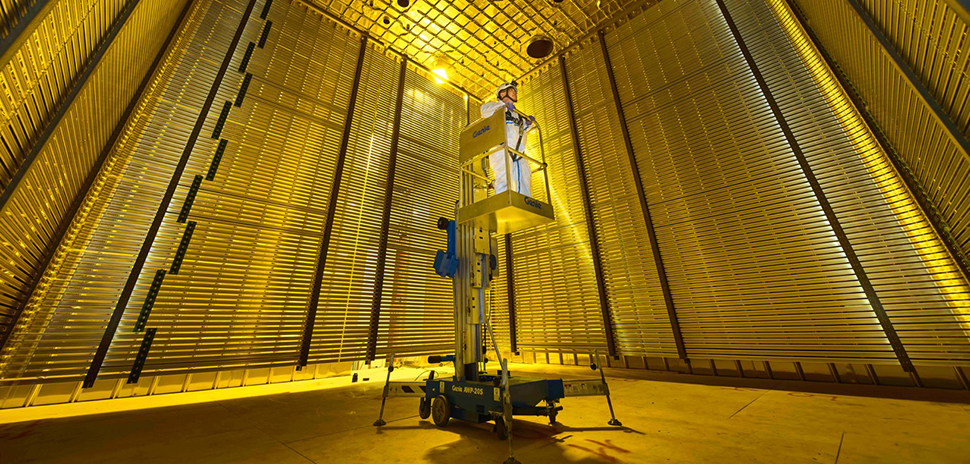UTA TEAM HELPS BUILD PROTOTYPES FOR INTERNATIONAL PHYSICS EXPERIMENT
![]() A team of researchers from The University of Texas at Arlington has played an important part in an international physics experiment.
A team of researchers from The University of Texas at Arlington has played an important part in an international physics experiment.
The researchers helped build prototypes for an aluminum electric field cage inside a particle detector for a experiment conducted at the European Organization for Nuclear Research in Geneva, Switzerland, according to UTA.
“UTA’s key role in the Deep Underground Neutrino Experiment prototype developments in Switzerland demonstrates the high regard in which we are held by the international physics community,” UTA Vice President for Research Duane Dimos said in a release. “High-energy physics is a research key area for UTA where we have invested in having one of the largest and best-regarded experimental physics groups in the country.”
“High-energy physics is a research key area for UTA where we have invested in having one of the largest and best-regarded experimental physics groups in the country.”
Duane Dimos
The work continues UTA’s role in internaitonal physics. In 2012, the university played an important part in finding the Higgs boson or “God particle” as part of an earlier international experiment conducted at the Large Hadron Collider in Switzerland.
The Higgs boson is an invisible force-field that permeates space and endows particles with mass, UTA said, and the discovery led to a Nobel Prize for Peter Higgs and Francis Englert, who led the research.
UTA had research expenditures of $3.5 million in 2017 and says it was involved in the world’s most prestigious new particle physics experiments in the U.S. and around the globe.
There’s more here in Louisa Kellie’s report.
TECH MAHINDRA, UTD TO COLLABORATE ON ‘MAKERS LAB’
Tech Mahindra, a Mumbai, India-based provider of digital transformation, consulting, and business re-engineering services and solutions, announced that it will launch its first U.S. “Makers Lab” research and development center in Plano in collaboration with the University of Texas at Dallas in Richardson.
“Innovation is the key to ensure that we are future-ready.”
C.P. Gurnani
Tech Mahindra professionals will team up with students to “drive customer-centric innovation by leveraging next generation technologies,” according to the company.
“Innovation is the key to ensure that we are future-ready. Through our research arm Makers Lab in the U.S., we intend to inspire our partner ecosystem, academia, and employees to focus on innovation in next gen technologies and customer experience,” Tech Mahindra CEO C.P. Gurnani said in a release. “We believe it is our responsibility to invest in the local communities we operate in and initiatives like these help inspire and increase the employability of future technologists.”
Tech Mahindra has seven R&D centers around the world, including the new Plano center.
CLINICAL TRIAL EXAMINES PRESERVING SEXUAL FUNCTION IN PROSTATE CANCER PATIENTS
A multicenter clinical trial being led by physicians at UT Southwestern Medical Center is testing a new technique that could preserve the sexual potency of patients receiving radiation therapy for prostate cancer.

Dr. Neil Desai
The technique could spare nerve bundles and arteries involved in sexual function, according to UTSW.
“Nowadays, mortality after treatment for localized prostate cancer is as low as 1 percent in 10 years,” said Dr. Neil Desai, assistant professor of radiation oncology and principal investigator in the POTEN-C trial. “By contrast, as many as half of all patients being treated for prostate cancer will experience some decline in sexual function. It is appropriate, therefore, that our focus has shifted to this aspect of quality of life.”
UTSW said the new technique undergoing testing involves reducing the radiation dosage on one side of the prostate, where imaging shows no cancer. That spares nerves and blood vessels on that side of the prostate.
Find out more here.
READ NEXT
![]()
Get on the list.
Dallas Innovates, every day.
Sign up to keep your eye on what’s new and next in Dallas-Fort Worth, every day.

































































